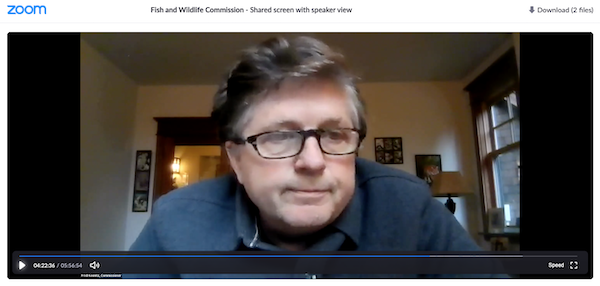
Koontz Resigns From WDFW Commission
Editor’s note: Updated 11:30 a.m., December 13, 2021, with the former commissioner’s resignation letter.
Fred Koontz has resigned from the Washington Fish and Wildlife Commission, less than 12 full months into a six-year stint on the citizen panel that sets policy for WDFW.

The Duvall resident, retired conservation director for the Woodland Park Zoo and PhD. has recently drawn fire for his thoughts on lowering the Blue Mountains elk objective in the face of predation that is sharply depressing calf recruitment to untenable levels, and his vote against the limited-entry spring bear hunt after casting doubt on WDFW staff training and other issues.
Comments he made during the December 3 commission meeting may have presaged Koontz’s decision to leave.
“This has been a very tough year for me to be on the commission and, uhh, I guess I’ve been in the commissioner doghouse more than I’ve been out of it. It wasn’t at all what I was expecting,” he told fellow members during their vote for the chair and vice chairmanships.
Koontz’s resignation letter to Governor Inslee states that “I found that I had no meaningful role in protecting the public’s wildlife trust. The Commission is currently stuck in a politicized quagmire. We have largely lost the ability to have civil public conversations. This is not the kind of environment in which I thrive. I hope that your future appointments to the Commission can be better politicians than me, as I am a conservation biologist at heart. I urge you to fill all the open Commission seats as rapidly as possible.”
The departure leaves two empty seats on the nine-member panel. Koontz occupied an “at-large” position.
“We appreciate Fred’s engagement and curious mind on the Commission,” said Fish and Wildlife Commission Chair Larry Carpenter in a press release out this morning. “He encouraged us to be bold in our mission and we enjoyed his passion for biodiversity conservation.”
Koontz was a key drafter in the proposed new WDFW conservation policy, rolled out in September. His “modern synthesis” argued that “Conservation should be done in its own right. In other words, it doesn’t have to have a use of the animals.”
It was also a bid to expand the agency’s tent and support base, and true he seconded the motion to approve the 2021-23 big and small game hunting packages, meaning he can’t simply be derided as an antihunter, but there was a definite feeling this fall that the commission was coming unmoored from its traditional constituents, hunters and anglers, and Koontz was no small part in that.
In mid-November, Koontz and others eschewed WDFW’s own experts – its biologists, carnivore and hunting managers – in voting against the spring bear hunt, despite there being zero conservation concerns, so there won’t be a season in 2022.
And it became a blaring alarm early this month with Koontz and Smith’s statements that the critically struggling Blue Mountains elk herd might not really be in crisis if the management objective was simply lowered to the 20-year average. A capture-collar study this year found that just 11 percent of 125 calves survived their first 150 days, with 77 of those young wapiti killed by predators, primarily cougars. Smith wanted to reduce hunter harvest even further than deal with the issue at hand.
It led to a dressing down (as well as olive branches) from hunters earlier this month, which led to a segment on the Dori Monson Show on KIRO Radio 97.3.
For Tom Nelson, host of The Outdoor Line on Seattle’s 710 ESPN, today’s resignation highlights the need for the Governor’s Office to make non-ideological appointments to the commission.
“If you can’t simply appoint reasonable people to make public policy, what are you doing?” he asked. “We’re trying to put food on our table.”
The commission has also been down a member for all of 2021 with the end of Dave Graybill’s term last New Year’s Eve, and that’s left a crucial Eastern Washington seat unfilled by the Governor’s Office.
Now the panel will be only seven members strong, with Chair Larry Carpenter’s term also officially up but remaining onboard to steer through increasingly tumultuous times.
Besides serving on the commission, Koontz was a member of WDFW’s Wildlife Diversity Advisory Council and its Budget and Policy Advisory Group, or BPAG. He was also on the Snoqualmie Wildlife Area Advisory Committee.
“Despite my personal disappointment,” Koontz wrote in his resignation letter, “I still believe significant progress can be accomplished toward protecting Washington’s fish and wildlife in the coming months and years. While I questioned the Department’s leadership on a number of their decisions, please know that I was inspired by the deep dedication and character of the Department’s 1,900 employees. Finally, listening to all sides of the public testimonies at Commission meetings also is a sign that the public cares.”
Editor’s note: Here follows Fred Koontz’s resignation letter in full:
December 13, 2021
Governor Jay Inslee
Office of the Governor
PO Box 40002
Olympia, WA 98504-0002
Dear Governor Inslee,
This letter confirms my resignation from the Washington Fish & Wildlife Commission effective December 13, 2021.
Last January, I accepted your appointment with the understanding that I would participate in the Commission’s supervising authority and policymaking to oversee the Fish & Wildlife Department’s actions. Especially key to me and many Washingtonians are the Commission’s conservation-related decisions that safeguard the state’s biodiversity for current and future generations.
Unfortunately, I found that I had no meaningful role in protecting the public’s wildlife trust. The Commission is currently stuck in a politicized quagmire. We have largely lost the ability to have civil public conversations. This is not the kind of environment in which I thrive. I hope that your future appointments to the Commission can be better politicians than me, as I am a conservation biologist at heart. I urge you to fill all the open Commission seats as rapidly as possible.
Despite my personal disappointment, I still believe significant progress can be accomplished toward protecting Washington’s fish and wildlife in the coming months and years. While I questioned the Department’s leadership on a number of their decisions, please know that I was inspired by the deep dedication and character of the Department’s 1,900 employees. Finally, listening to all sides of the public testimonies at Commission meetings also is a sign that the public cares.
Sincerely,
Fred W. Koontz, Ph.D.
WA Fish & Wildlife Commission
Cc: Larry Carpenter, Chair, WA Fish & Wildlife Commission; Jamila Thomas, Chief of Staff, Office of the Governor; JT Austin, Senior Policy Advisor, Natural Resources, Office of the Governor; Ambar Algera, Director of Boards and Commissions, Office of the Governor.

